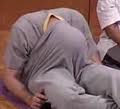Why You Should Stop Stretching
Whoa there, partner!! Before you jump off the handle and say I don’t know what I’m talking about by saying you should stop stretching, chillax for a second, take a deep breath, and let me further confuse you. You should stop stretching joints, and try to just stretch muscles.
Time after time I’ve had clients come in to me and say they need more flexibility, when they really need more stability. I take them through a small range of motion workout to get their core working, position their scapula correctly, and move their hips, and all of a sudden, they have amazing range of motion!!! Hallelujah!!! Pay at the front.
Now I do find that stretching is beneficial, if done correctly, and with the joint position in mind. Most people stretch completely wrong, but will look to find ways to make their squat or deadlift stronger. They’ll pay only minimal amount of attention to stretch technique, but spend hours trying to “mobilize” their hips and spine. Let’s take the classic hurdlers stretch for the hamstrings. People try to touch their toes, regardless of where the joint motion is coming from, and wind up rounding their backs so far that they look like Will Ferrell trying to perform the Smiling Cobra in yoga class.
Sure, they feel it in the hamstrings, but that;s just because they’re the longest unbroken muscle in that posterior fascial line, and it has the greatest room to stretch. Does it mean it’s a good stretch? No!! If you have any pre-existing back injuries that make you flexion intolerant (like the author of said post), you’re going to wind up making things worse.
Now this next point is cooler than a polar bears toe nails: You don’t have to spend copious amounts of time stretching with static holds to get more flexible and better performance. In fact, most static stretching won’t do you any good, unless you have a fascial hyperactivation, in which case it’s the best thing since sliced bread.
Most active stretches should be done with the specific joint mechanics in mind. If you’re stretching your hamstrings, make sure your spine doesn’t flex, or else you’re loading it with shear and compression, which makes for some unhappy discs. If you’re stretching your shoulders, make sure you get the scapula in the right place, or else you’ll torque on the glenohumeral joint, and may actually create a rotator cuff issue. When in doubt, lift some heavy stuff,and stop stretching. You might wind up feeling better.


3 Responses to Why You Should Stop Stretching